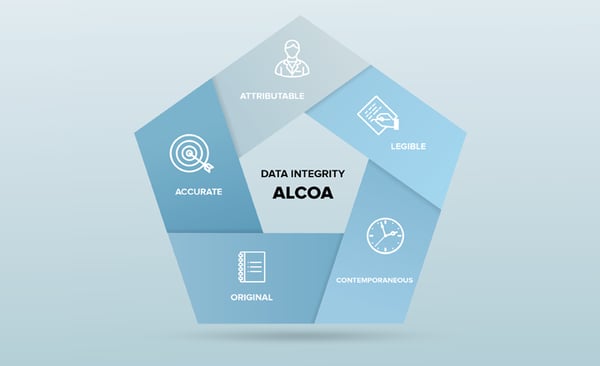blog
February 5, 2020 | Source: Rapid Micro Biosystems, Inc.
How Rapid Micro Biosystems Approaches Data Integrity
POSTED BY Rapid Micro Biosystems | 7 minute read
February 5, 2020 | Source: Rapid Micro Biosystems, Inc.
POSTED BY Rapid Micro Biosystems | 7 minute read
David Jones, Director, Technical Marketing and Government Affairs at Rapid Micro Biosystems, spoke with rapidmicrobiology.com on how rapid micro methods (RMMs) can help a modern pharmaceutical microbiology quality control (QC) laboratory overcome pressures introduced by the production of Advanced Therapeutic Medicinal Products (ATMPs), embracing ALCOA data integrity principles and staying ahead in this competitive industry.

What is RMB trying to do to help support ATMP companies?
The modern Pharmaceutical Microbiology Quality Control (QC) lab is faced with a number of new challenges driven by product innovation, regulatory focus and/or commercial efficiencies. The introduction of new treatments can lead to paradigm shifts in the QC functions. One such innovation would be the Advanced Therapy Medicinal Product (ATMP) that have an extremely short shelf life from production to return to the critically ill patient from the point of manufacture to the point of care. As the product is manufactured as an aseptic product and requires a sterility test to release, which typically takes 14 days, changes must be made to traditional processes to facilitate their accelerated release. We are working with regulators on increasing in-process testing and Environmental Monitoring (EM) testing (short incubation times) to reduce the risk of releasing the product after only 2-5 days of the formal sterility test. Implementation of Rapid Microbial Methods (RMM) for in process, EM and sterility tests has also facilitated a lower risk for an early release to the patient.
What are the most common challenges you see in the micro lab?
Commercial pressure to reduce costs and shorten release times for improved patient outcomes can also be a major focus for microbiology lab management. Often microbiology testing can be the slowest part of a release process and as such draws attention when looking to reduce release cycle times and incumbent costs. Implementation of an automated colony counter can address both these issues by shortening incubation times and removing the need for analysts to manually read the mountains of petri plates that are generated during routine tests. The analyst’s time when unencumbered from that task can be reassigned to other critical tasks to support an increased testing and oversight capacity.
With all the many manufacturing processes, how do you maintain Data Integrity, and how do you maintain DI with a rapid method?
Recently the regulatory agencies have been focusing in on the microbiology laboratory process of colony counting. This is one of the few QC test areas where a sample is taken, run through a test and the final result is read by one person and then the original date (the plate) is disposed of. This process can lead to mistakes in accuracy or possible fraudulent activities. In particular, use of high-performance liquid chromatography systems with stored data that can be manipulated to get a “cleaner” result and reducing the numerous “test runs” before running the final test, instigated this regulatory focus.
Can Rapid Methods comply with the full requirements of ALCOA?
Companies are implementing a number of different ways to address this issue; from having a second person read every plate to spot checks every few months. The disparity in approach can lead to regulatory inspection focus on this area which is evident in the regulatory findings publicly available. The ALCOA acronym is often used for the requirements of data integrity, Attributable, Legible, Contemporaneous, Original and Accurate. The implementation of automated rapid micro method (RMM) systems for incubation, colony counting and reporting can have a major quality improvement for the release of data. The new RMM systems are also fully 21CFR11 compliant with audit trails, controlled access and assigned user responsibilities to qualified functions. The Growth Direct™ (GD) system tracks each sample cassette from loading to automated data drop to a LIMS system so negating any opportunity post sampling to manipulate data or have transcription errors. The GD system can therefore comply with all the requirements of ALCOA.
What can automation and DI do for the micro lab?
Over the last 20 years Rapid Micro Methods (RMMs) have evolved from being an esoteric interest to a key component of an efficient and modern laboratory. Technologies are now available to perform all the key test requirements in a QC laboratory from EM testing to bioburden and sterility. However, only one system, Growth Direct, can address all tests on one technology format. Most of the RMM technologies available have been accepted by global regulatory authorities once validated using the multiple guidelines available and have been implemented for routine testing. Once implemented the benefits of improved data security, faster sample turnaround and more efficient staff utilization can be realized.
Related Articles:
[White Paper] Impact of Data Integrity Audits on Pharma Microbial QC Labs
We are working with regulators on increasing in-process testing and Environmental Monitoring (EM) testing (short incubation times) to reduce the risk of releasing the product after only 2-5 days of the formal sterility test.
With all the many manufacturing processes, how do you maintain Data Integrity, and how do you maintain DI with a rapid method?
To learn how Rapid Micro Biosystems can help your company, please contact us here.
To learn more about Growth Direct™, please visit here.